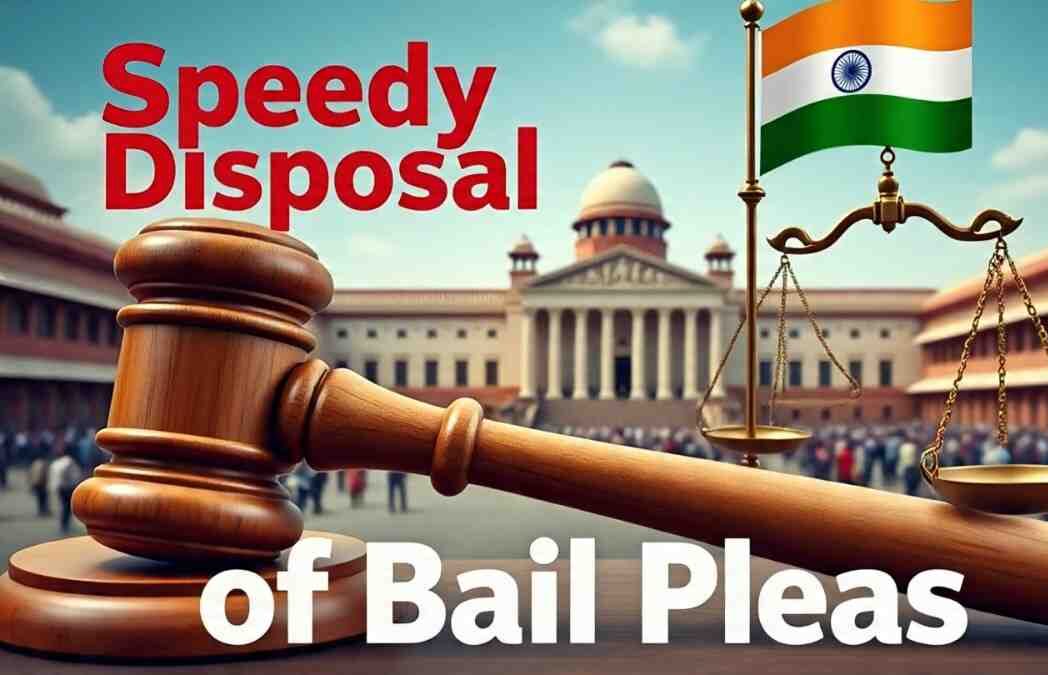The Supreme Court of India in Arvind Kumar v. State of U.P. (2025) directed High Courts to ensure bail and anticipatory bail pleas are decided within two months. The ruling emphasizes safeguarding personal liberty under Article 21 of the Constitution.
Introduction
The Supreme Court of India has once again reinforced the primacy of personal liberty by directing High Courts to ensure that subordinate courts dispose of bail and anticipatory bail pleas within two months. The judgment, delivered in Arvind Kumar v. State of Uttar Pradesh & Ors. (2025), stresses that unnecessary delays in bail hearings violate Article 21 of the Constitution, which guarantees the right to life and personal liberty.
Background of the Case
- Case Name: Arvind Kumar v. State of Uttar Pradesh & Ors.
- Court: Supreme Court of India
- Issue: Prolonged pendency of bail and anticipatory bail applications before trial courts and High Courts.
The petitioner argued that keeping bail applications pending for months effectively amounts to “punishment before trial”, defeating the principle of presumption of innocence.
Supreme Court’s Key Observations
- Personal Liberty is Paramount: The Court held that “personal liberty cannot be sacrificed at the altar of judicial delays.”
- Time-Limit of Two Months: All bail and anticipatory bail applications must be decided within two months from filing.
- High Courts’ Duty: High Courts have been instructed to monitor trial courts and issue directions ensuring compliance.
- Article 21 Protection: The Court emphasized that speedy trial and quick disposal of bail pleas form an essential part of Article 21 of the Constitution.
- No Mechanical Denials: Bail should not be rejected mechanically or left pending for long durations without valid reasons.
Significance of the Ruling
- Strengthens Rule of Law: Reinforces that detention cannot be indefinite without proper judicial scrutiny.
- Reduces Jail Overcrowding: Quick disposal of bail pleas may help decongest Indian prisons, where many inmates are undertrials.
- Judicial Accountability: Puts pressure on both trial courts and High Courts to treat bail matters as urgent.
- Human Rights Angle: Aligns Indian jurisprudence with global standards where liberty is prioritized unless compelling state interest demands otherwise.
Legal Precedents Cited
The Supreme Court referred to earlier rulings, such as:
- Hussainara Khatoon v. State of Bihar (1979) – Right to speedy trial under Article 21.
- Satender Kumar Antil v. CBI (2021) – Bail is the rule, jail is the exception.
Conclusion
The ruling in Arvind Kumar v. State of U.P. is a landmark reminder that justice delayed is justice denied. By setting a two-month ceiling for deciding bail pleas, the Supreme Court has taken a proactive step to safeguard personal liberty, uphold constitutional values, and reduce systemic delays in India’s criminal justice system.
Frequently Asked Questions (FAQs) on Supreme Court Bail Ruling
What did the Supreme Court say about bail in 2025?
In Arvind Kumar v. State of Uttar Pradesh (2025), the Supreme Court directed that all bail and anticipatory bail applications must be decided within two months. The Court emphasized that delays in bail hearings violate the right to personal liberty under Article 21 of the Constitution.
Why is the two-month timeline important for bail pleas?
The two-month timeline ensures that bail applications are not kept pending indefinitely, preventing undertrials from languishing in jail unnecessarily. It also strengthens the principle that “bail is the rule, jail is the exception.”
How does this ruling affect trial courts and High Courts?
High Courts must supervise subordinate courts to ensure compliance. Trial courts are bound to prioritize bail matters and avoid unnecessary adjournments. High Courts themselves must also decide pending bail applications within the stipulated time.
Which constitutional right is linked to speedy bail disposal?
The ruling is directly tied to Article 21 of the Indian Constitution, which guarantees the right to life and personal liberty. The Court has made it clear that delayed bail hearings are a violation of Article 21.

























